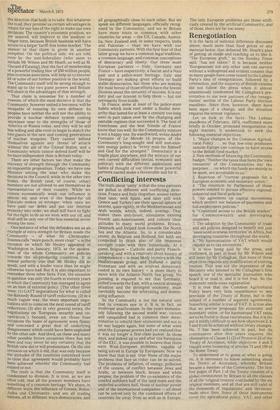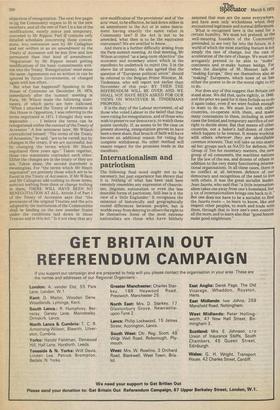Renegotiation
It is the facts of national difference discussed above, much more than food prices or any material factor, that defeated Mr. Heath's plan of getting us inside and teaching us to like it. "The European graft," as the Sunday Times said, "has not taken." It is because neither 'Europeanism' nor any other -ism can survive without a widespread and evident consent that so many people have come round to the Labour Party's idea of renegotiation, followed by a referendum, and the majority of British citizens did not follow the press when it almost unanimously condemned Mr Callaghan's presentation to our new partners of the `renegotiation' section of the Labour Party election manifesto. Since then, however, there have been signs of a change, and the situation requires the utmost vigilance.
Let us look at the facts. The Labour manifesto of February, 1974, reaffirmed more briefly in October, promised renegotiation on eight matters. It undertook to seek the following essential objectives: 1. "Major changes in the Common Agricultural Policy . . . so that low-cost producers outside Europe can continue to have access to the British food market."
2. New methods of financing the Community budget. "Neither the taxes that form the 'own resources' of the Communities nor the purposes ... on which the funds are mainly to be spent, are acceptable to us."
3. Rejection of "current proposals for a European economic and monetary union." 4. "The retention by Parliament of those powers needed to pursue effective regional, industrial and fiscal policies."
5. "An agreement on capital movements which protect our balance-of-payments and full-employment policies."
6. "Continued access to the British market" for Commonwealth and developing countries.
7. The adoption by the Community of trade and aid policies designed to benefit not just 'associated overseas territories' in Africa, but developing countries throughout the world. 8. "No harmonisation of VAT which would require us to tax necessities."
It is now being said by the press, and confirmed, in part at least by Mr Wilson and still more by Mr Callaghan, that none of these objectives requires any modification of existing treaties. That was not the impression of the Ministers who listened to Mr Callaghan's first speech, nor of the specialist journalists who heard it or read it, and it is not true. So the statement needs some explanation.
It is true that the Common Agricultural Policy bears very little resemblance to any provision of the Treaty of Rome, but is the subject of a number of separate agreements. Something similar is true of VAT. It is true also that no precise proposals for economic and monetary union, or for harmonised VAT rates, are to be found in those two treaties. But it is (to put it mildly) difficult to see how objectives 2,4, 5 and 6 can be achieved without treaty changes.
No. 7 has been achieved in part, but its continuance after five years requires the elimination of Clause 11(2) of Protocol 22 of the Treaty of Accession, while objectives 4 and 5 require some loosening of articles 73 and 109 of the Rome Treaty.
To understand or to guess at what is going on, it is necessary to know something about the Treaty of Accession, whereby Britain became a member of the Community. The first few pages of Part I of the Treaty consists of a global commitment by Britain to all the clauses of all the 'original treaties' concluded by the six original members, and all that are still valid of the thousands of 'regulations' and 'decisions' made since then. Some of these instruments cover the agricultural policy, VAT, and other objectives of renegotiation. The next few pages re-jig the Community organs to fit in the new members, and all the rest of Part I is a list of the modifications, mostly minor and temporary, conceded to Mr Rippon. Part II contains only detailed schedules concerning these concessions. Any concession won by Mr Callaghan and not written in as an amendment to the Treaty of Accession will be less firm and less permanent than that kind of amendment. 'Negotiation' by Mr Rippon meant getting modifications of the basic commitments written into the Treaty. 'Renegotiation' must mean the same. Agreements not so written in can be ignored by future Governments, or changed again with less effort.
But what has happened? Speaking in the House of Commons on December 16, 1974,_ immediately after the 'summit' meeting in Paris, Mr Wilson made the following statements, of which parts are here italicised. "When I attacked the Treaty of Accession in this House in Opposition, I was referring to the terms negotiated in 1971. I thought they were deplorable . . I believe the terms can be renegotiated within the context of the Treaty of Accession." A few sentences later, Mr Wilson; contradicted himself. "The terms of the Treaty of Accession," he said, "are to be varied, not by changes in the treaty, if we are successful, but by changing the terms which Mr Heath negotiated three years ago." Taken together, those two statements contradict each other. Either the changes are in the treaty or they are not. Taken alone, the second statement is meaningless. For "the terms which Mr Heath negotiated" are precisely those which are to be found in the Treaty of Accession. If Mr Wilson and Mr Callaghan add nothing to those terms,. subtract nothing from them or change nothing in them, THERE WILL HAVE BEEN NO RENEGOTIATION AT ALL. Article 2 of Part I of the Treaty of Accession says that "the provisions of the original Treaties and the acts adopted by the institutions of the Communities shall be binding on the new member States under the conditions laid down in those Treaties and in this Act." Is it not clear that any new modification of the provisions' and of the acts' must, to be effective, be laid down either in an amendment to the Act or in some instrument having exactly the same value in Community law? If the Act is not to be amended, what then is to be the equivalent instrument? We are entitled to know.
And there is a further difficulty arising from the Paris summit meeting. At that meeting, Mr Wilson accepted "as a long-term objective" the economic and monetury union which in the manifesto he undertook to reject (no. 3 in the above list of terms). He also agreed that the question of "European political union" should be referred to the Belgian Prime Minister, M. Tindemans, who will report not earlier than November of this year. BY THEN THE REFERENDUM WILL BE OVER AND WE SHALL NOT HAVE BEEN ASKED FOR OUR VIEWS ON WHATEVER M. TINDEMANS PROPOSES. • It is the duty of the Labour movement, of all those who voted Labour in the belief that they were voting for renegotiation, and of those who wish to preserve our democracy, to watch these points carefully. If, as seems to be the case on present showing, renegotiation proves to have been a mere sham, that breach of faith will have become an additional reason for voting for complete withdrawal, No other method will ensure respect for the promises made in the manifesto.











































 Previous page
Previous page